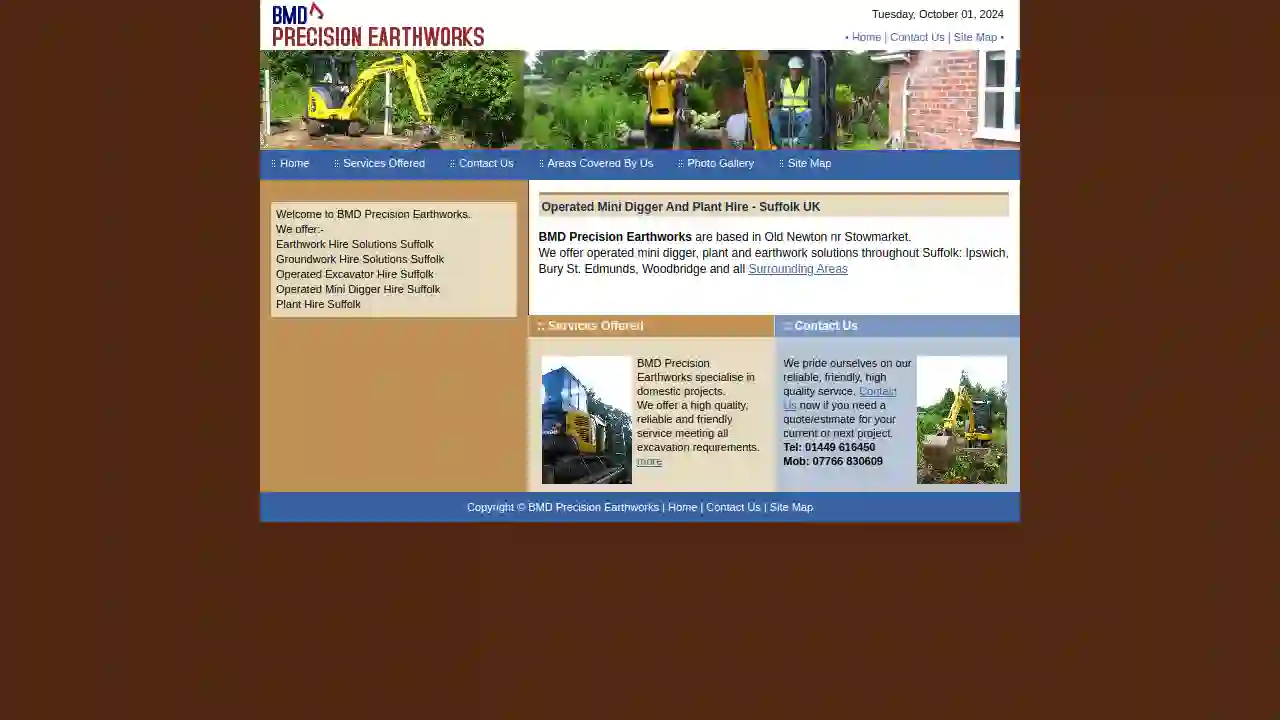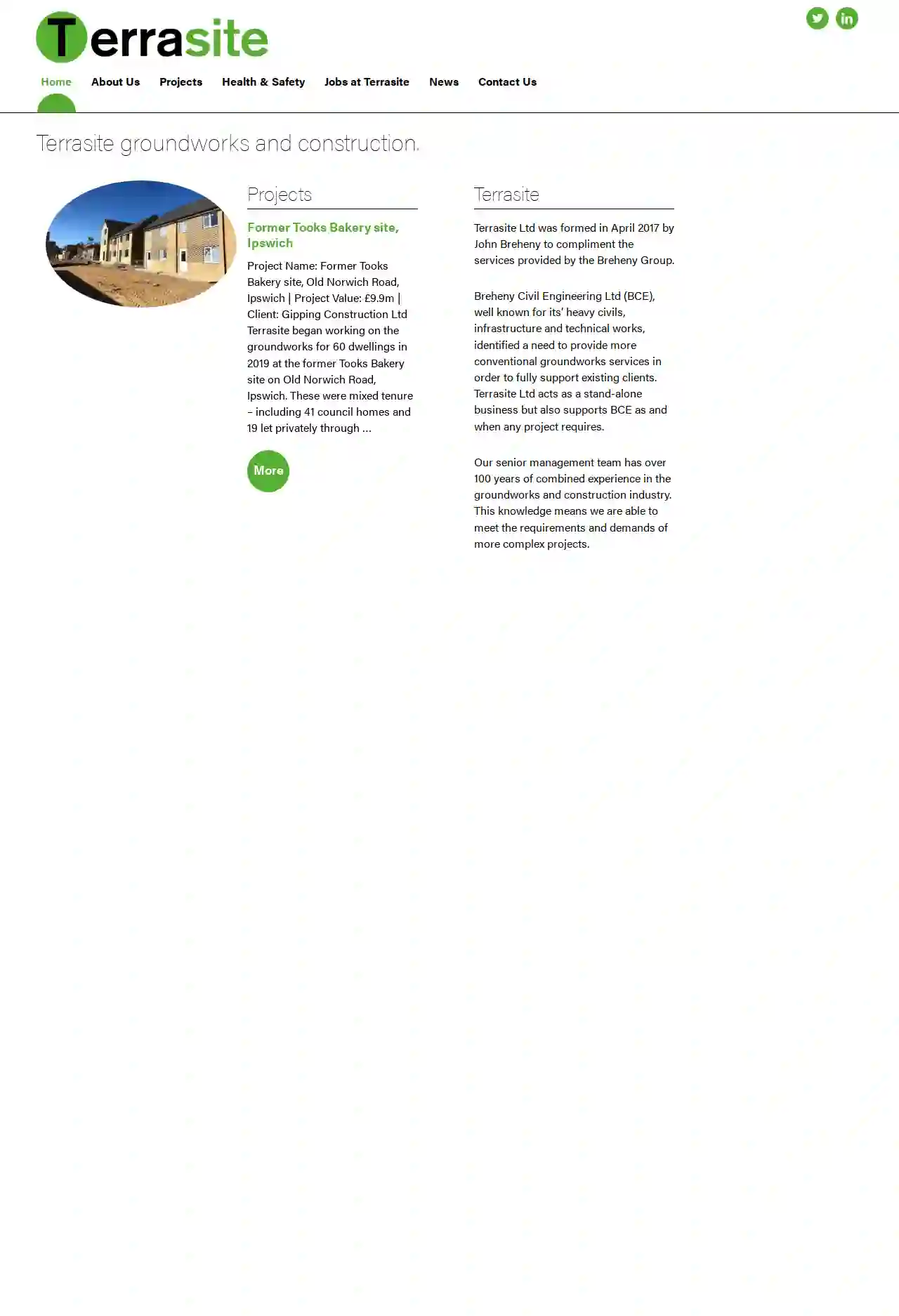Excavation Contractors Great Cornard
Best Excavation Contractor in Great Cornard
Get multiple Excavation Services quotes for your project today! Compare profiles, reviews, accreditations, portfolio, etc... and choose the best offer.

New View Construction
55 reviewsMartlesham Heath, GBAbout New View Construction The directors of New View Construction have been in the building/construction industry for over 40 years. During that time we have been involved in contracts all over the country, working with various domestic and commercial contractors, gaining experience, trust and knowledge. We pride ourselves on high quality workmanship, together with a strong commitment to a professional tailored service. We are proud to have extensive experience and knowledge in the building/construction industry with reliable services and competitive pricing. We have a strong commitment to customer satisfaction and continuous site supervision that ensures high health and safety standards. We are based in Martlesham Heath, Ipswich and cover all of Suffolk & Essex and parts of Norfolk.
- Services
- Why Us?
- Gallery
Get Quote
Booth Tarmacadam
4.73 reviewsUnit 20A, Seven Acres Business Park, Unit 20A Seven Acres Business Park Newbourne Rd Woodbridge Suffolk, Woodbridge, IP12 4PT, GBBooth Tarmacadam East Anglia - Specialists in Contract Surfacing Independent Surfacing Contractors across East Anglia for almost 50 Years Family-owned surfacing specialist, Booth Tarmacadam, is one of East Anglia’s leading professional tarmac contractors. A long-standing, medium-sized tarmac-laying business with its own workforce, we specialise in hand-laid surfacing for both domestic and commercial customers across Suffolk, Norfolk, Essex and Cambridgeshire. Quality, reliability, great workmanship and value for money – they’re just some of the things our customers compliment us about. These are the values upon which we have been building our reputation on since 1982. Surfacing Specialists for Residential & Commercial Projects Booth Tarmacadam have extensive experience in working with commercial partners and private property owners. Whether you are looking for a domestic driveway for you own house or an entire development: surfacing for your office car park or a whole bus station; paths and playgrounds for your school or local village, we can help. We provide a service for a wide range of customers including: Individual Home-owners Major House-builders Offices & Businesses Schools & Academies Housing Trusts Local Councils No job is too small – from private paths to playgrounds Tarmac surfacing Resin-bonded surfacing Block-paving Tar and shingle / chip Slabbing Driveways Paths / Footpaths Car Parks Playgrounds Access Roads Booth Tarmacadam Ltd From laying tarmac paths for major new housing developments in Essex to creating bespoke resin-bound or block-paving driveways for properties in Norfolk; putting down specialist coloured-tarmac surfacing for school playgrounds in Suffolk or surfacing commercial parking areas in Cambridgeshire, Booth Tarmacadam have a real history of successfully completing contract surfacing projects great and small across East Anglia. Whatever your surfacing need, Suffolk-based Booth Tarmacadam have the genuine expertise to help you choose the right surfacing option for your project or property - so you can make an informed decision in your own time. No hard sell. Just honest advice and a clear, free, no obligation quotation at a competitive price. Why not get in touch today?
- Services
- Why Us?
- Testimonials
- Gallery
Get Quote
WJS Contracting
4.574 reviewsIpswich, GBTake your yard to the next level Order a Firewood Delivery Today! QUALITY & PROFESSIONALISM WITH A SMILE More than just a contracting company Our goal at WJS Contracting is to handle all of your outdoor services with professionalism, quick communication, and a smile on our face. Headquartered just north of Boston MA, we bring the team and the lineup of heavy equipment to handle any size outdoor project. PROUD TO BE THE ONLY BOXWEDGE FIREWOOD PROVIDER IN MASSACHUSETTS Firewood delivered straight to your door As one of the largest firewood providers in New England, we offer a variety of firewood, including: green hardwood, semi seasoned hardwood, and seasoned hardwood. All delivered to you. WJS Contracting is the only company in Massachusetts with box wedge firewood!
- Services
- Why Us?
- Gallery
Get Quote
Landmark Construction Services Ltd
2.77 reviews11 Bullen Ln, Bramford, Ipswich, IP8 4JD, GBLandmark Construction We undertake contracts from both the private and commercial sectors, covering a wide range of different size projects, from small home and garden improvements, through to large housing and industrial estate developments. The Family owned and run business specialises in groundwork, civil engineering and new build projects for a variety of industrial and domestic clients. We pride ourselves on providing an efficient, flexible, reliable and competent service at all times. AN EXPERIENCED AND SKILLED TEAM The company is staffed by an experienced and skilled team, equipped to undertake a variety of projects irrespective of size and complexity. This also ensures that all work is tailored to meet the clients needs. A THOROUGH, HIGH STANDARD OF WORK The area of construction in which we operate is extremely competitive and it can be very difficult for anyone to consider using a new supplier. However, we can assure you that our staff consistently seek to provide a thorough, high standard of work and a level of service and reliability that ensures our customers are happy to return to us for their future requirements.
- Services
- Why Us?
- Our Team
- Gallery
Get Quote
BMD Precision Earthworks
Elmtree House, Silver Street, Elmtree HouseSilver StreetOld NewtonStowmarket, Old Newton, IP14 4HF, GBWelcome to BMD Precision Earthworks BMD Precision Earthworks are based in Old Newton nr Stowmarket. We offer operated mini digger, plant and earthwork solutions throughout Suffolk: Ipswich, Bury St. Edmunds, Woodbridge and all Surrounding Areas. BMD Precision Earthworks specialise in domestic projects. We offer a high quality, reliable and friendly service meeting all excavation requirements. We pride ourselves on our reliable, friendly, high quality service. Contact Us now if you need a quote/estimate for your current or next project.
- Services
- Why Us?
- Gallery
Get Quote
Mark Barker Digger Services
548 reviewsIpswich, GBAbout Mark Barker Digger Services Mark Barker Digger Services is a trusted and experienced provider of mini digger hire with a driver for both commercial and residential customers in Ipswich and surrounding areas. With over 30 years of experience in civil engineering, Mark offers competitive rates and reliable service, ensuring your project is completed to the highest standards. Mark's expertise extends beyond mini digger hire. He also provides a 1-ton dumper for soil removal, making it a one-stop shop for your excavation needs. Mark's mini digger is a Kubota U17, boasting a dig depth of 2.3 meters, making it ideal for digging footings or trenches. Its compact size allows it to access tight spaces in residential properties, where larger diggers may struggle. The mini digger's precision leveling capabilities make it perfect for preparing the ground for patios or decking. Mark prides himself on transparency and reliability. Quotes are provided with no hidden extras, except for fuel charges, which are calculated based on usage. To ensure accurate costing, Mark encourages customers to provide as much information as possible about their project, including site access and photographs.
- Services
- Why Us?
- Our Team
- Gallery
Get Quote
Terrasite Ltd
51 reviewsFlordon Road, Creeting St Mary, Needham Market, Suffolk, IP6 8NH, GBTerrasite: Groundworks and Construction Terrasite Ltd was formed in April 2017 by John Breheny to compliment the services provided by the Breheny Group. Breheny Civil Engineering Ltd (BCE), well known for its’ heavy civils, infrastructure and technical works, identified a need to provide more conventional groundworks services in order to fully support existing clients. Terrasite Ltd acts as a stand-alone business but also supports BCE as and when any project requires. Our Experience Our senior management team has over 100 years of combined experience in the groundworks and construction industry. This knowledge means we are able to meet the requirements and demands of more complex projects. Our Values We believe in working ‘with’ our clients, ensuring any project is delivered to budget and to an agreed timescale. Using our knowledge and experience within our specific sector of groundworks we believe we can assist all our clients, should they so wish, to achieve the best overall result for any project regards buildability and value engineering. Our values remain that of the Breheny Group: We value our people, customers and suppliers. We treat our people fairly and equitably. We want our people to enjoy their work and progress their careers in a stable, safe environment. We seek repeat business from customers. We develop good relationships with suppliers. We have respect for the community and environment. We minimise our impact on the environment and the communities in which we work. We support community projects that involve our employees. We believe in openness and honesty. We comply with all applicable law. We work as a team with our customers. We keep our people informed of developments within the Company We take pride in what we do. We do everything to the highest possible standard. We reinvest profits to maintain an extensive and modern plant fleet. We continuously improve our performance. “Breheny is a family business that builds long term relationships with its customers through the quality of its workmanship and the excellent service it provides.” – John Breheny, Chairman.
- Services
- Why Us?
- Gallery
Get Quote
Tarnowski Construction
Rowley, GBAbout Us Tarnowski Construction is New England’s go-to construction service business. Whether you’re looking for sitework, demolition, excavation, snow removal or trucking, Tarnowski Construction is here to help you with your next project! Quality Quality of work at Tarnowski Construction is key to getting the job done. We value our clients commitment to trusting us! Safety Safety is our top priority. It is essential that on every job site, we abide by all laws and regulations and operate in a safe way. Growth We want to ensure that working with Tarnowski is beneficial for the client first. Life is about moving forward and we'd love to help! Equipment Tarnowski Construction ensures that we have the capability to get the job done. No project will ever be left stranded.
- Services
- Why Us?
- Gallery
Get Quote- BH
BHA Carpentry & Construction
4.929 reviewsIpswich, GB- Services
- Why Us?
- Gallery
Get Quote - To
Town Farm LLC
Ipswich, GBWe are a local business dedicated to providing high-quality services to our community. Our team is committed to exceeding your expectations and delivering exceptional results. We are passionate about what we do and strive to build lasting relationships with our clients. Contact us today to learn more about how we can help you achieve your goals.
- Services
- Why Us?
- Gallery
Get Quote
Over 13,059+ Excavation Contractors onboarded
Our excavation companies operate in Great Cornard & surroundings!
ExcavationHQ has curated and vetted Top Excavation Businesses in Great Cornard. Find a top & reliable pro today.
Frequently Asked Questions About Excavation Contractors
- Utility Locates: Contact your utility companies to mark the locations of underground lines before excavation begins. This is usually a free service.
- Hand Digging: Excavate carefully by hand near marked utility lines to avoid damage.
- Potholing: Digging small test holes to expose and verify utility depths and locations.
- Safe Distances: Maintaining a safe distance between excavation equipment and marked utility lines.
- Vacuum Excavation: Using vacuum excavation techniques to expose utilities without digging, reducing the risk of damage.
- Planning and Surveying: Defining the excavation area, marking utility lines, and determining the required depth and grade.
- Site Preparation: Clearing vegetation, removing obstacles, and ensuring site accessibility.
- Excavation: Using appropriate equipment (excavators, backhoes, etc.) to remove earth and create the desired excavation.
- Hauling and Disposal: Transporting excavated material to designated disposal sites, complying with environmental regulations.
- Backfilling and Compaction: Refilling the excavation with suitable material and compacting it to achieve the required density and stability.
- Grading and Finishing: Leveling and shaping the surface to the final grade for landscaping or construction.
- Sloped Property: Your property has a significant slope, making it prone to soil erosion or landslides.
- Creating Usable Space: You want to level off a sloped area to create a flat surface for patios, gardens, or other outdoor spaces.
- Preventing Damage: Erosion is threatening existing structures, driveways, or walkways.
- Landscaping Features: You're incorporating tiered gardens, raised beds, or other landscaping elements requiring soil retention.
How do you protect utilities during excavation?
What is the difference between excavation and grading?
Excavation: Primarily involves removing earth or other materials from a site. It's about digging down and creating space.
Grading: Focuses on shaping and leveling the ground to a specific slope or elevation. It's about adjusting the existing terrain.
For example, you might excavate a foundation and then grade the surrounding area to ensure proper drainage and a level surface for landscaping.
What is the excavation process?
How do I know if I need a retaining wall?
How do you protect utilities during excavation?
- Utility Locates: Contact your utility companies to mark the locations of underground lines before excavation begins. This is usually a free service.
- Hand Digging: Excavate carefully by hand near marked utility lines to avoid damage.
- Potholing: Digging small test holes to expose and verify utility depths and locations.
- Safe Distances: Maintaining a safe distance between excavation equipment and marked utility lines.
- Vacuum Excavation: Using vacuum excavation techniques to expose utilities without digging, reducing the risk of damage.
What is the difference between excavation and grading?
Excavation: Primarily involves removing earth or other materials from a site. It's about digging down and creating space.
Grading: Focuses on shaping and leveling the ground to a specific slope or elevation. It's about adjusting the existing terrain.
For example, you might excavate a foundation and then grade the surrounding area to ensure proper drainage and a level surface for landscaping.
What is the excavation process?
- Planning and Surveying: Defining the excavation area, marking utility lines, and determining the required depth and grade.
- Site Preparation: Clearing vegetation, removing obstacles, and ensuring site accessibility.
- Excavation: Using appropriate equipment (excavators, backhoes, etc.) to remove earth and create the desired excavation.
- Hauling and Disposal: Transporting excavated material to designated disposal sites, complying with environmental regulations.
- Backfilling and Compaction: Refilling the excavation with suitable material and compacting it to achieve the required density and stability.
- Grading and Finishing: Leveling and shaping the surface to the final grade for landscaping or construction.
How do I know if I need a retaining wall?
- Sloped Property: Your property has a significant slope, making it prone to soil erosion or landslides.
- Creating Usable Space: You want to level off a sloped area to create a flat surface for patios, gardens, or other outdoor spaces.
- Preventing Damage: Erosion is threatening existing structures, driveways, or walkways.
- Landscaping Features: You're incorporating tiered gardens, raised beds, or other landscaping elements requiring soil retention.